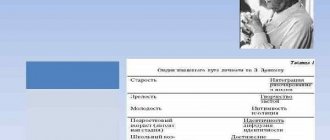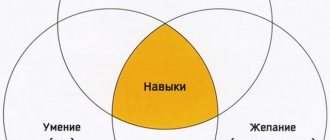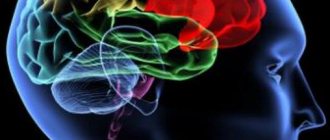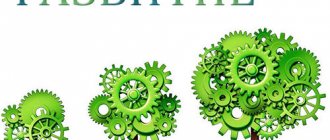Every person knows something. Some people are great at cooking, some people are good at landscaping. Some write good articles, publications, books, and some earn huge money on the stock exchanges. From childhood we learn things. First we acquire walking skills, then we learn the skill of knowing our native language. By the age of 4–5 we have mastered it at a sufficient level. Then we go to school and acquire skills in counting, writing, and so on.
These are all human skills. There is nowhere in this life without them.
Any business is improved by mastering technology. Every skill is achieved through exercise. Hippocrates
Simple and complex skills
Modern children are learning computers, which combine many other skills.
This may include proficiency in word processors, programming environments, and multimedia players. This is a complex skill. Unlike the simple one, it is quite difficult to fully master it and rarely does anyone understand all its aspects. Most often, some kind of specialization is acquired and a person swims in it like a fish in water. For example, rarely does anyone need to learn programming. Therefore, many people ignore computer knowledge at the program developer level. But at the user level (beginner, advanced), many people know it. Even pensioners, who are rarely friends with technology, have a good grasp of the main points on the computer. Communication on social networks with relatives, friends, for example, is easy for them.
Types of professional skills for a resume
The set of skills is conventionally divided into 4 groups , each of which corresponds to a specific activity:
- Thinking skills are important in intellectual activity. This is the ability to collect and analyze information (what is it?), structure knowledge “on shelves”, remember it and apply it at the right time.
For example, the key skills in the resume of an experienced investigator are knowledge of the law, the ability to work with legal frameworks, developed logical thinking, etc.
- Motor – this includes human movement in space, writing, working with equipment and tools.
For a secretary, touch typing skills are important; for an electrician, the ability to work with a screwdriver or hammer drill is important. Dancers must be able to dance, surgeons must be able to work with medical instruments, jewelers must be able to work with small parts. - Communication skills are how a person behaves in society and interacts with other people.
In the work of a manager (who is this?), concluding contracts, it is important to be able to talk with clients, motivating them to purchase a product. Psychologists learn to listen carefully to people, to capture barely noticeable but significant details in their speech. - Perceptual (sensory) – the ability to use the senses when perceiving the world around us: distinguish sounds, smells, touches.
These are key resume skills for sommeliers (who is that?), musicians, tasters, and more.
Each personality has its own set of skills to varying degrees: they mix and complement each other.
For example, the profession of a journalist requires that a person must be able to listen, ask the right questions, structure a story, and then create interesting articles.
Theoretical skills
Theoretical skills include everything that is associated with abstract material, but they do not know how to apply it in practice. So, knowledge of molecular biology is also a skill. Any skill is characterized by easy orientation to its essence. A skill can only be considered mastered when a person does not feel like he is performing an activity.
For example, a person who has learned to write does it automatically. He doesn't need to think about how to connect letters or how to draw them. Thanks to this, a person can gain the ability to write texts. After all, how can you write a high-quality, coherent and literate text if a person constantly thinks about how to draw a letter?
An example of a modern writer's skill
Also, for example, with typing text on a computer. When a person searches for each key before typing it on the screen, he cannot think about the content of the text. He loses his thoughts, the sentence becomes incoherent. After all, a person thinks when writing material, if he has mastered this skill, not in a word or even a sentence. He thinks in whole paragraphs. He can hold an entire structural part of an article in his head at one time.
And when a writer has mastered this skill, he doesn’t even have the question “How to write?” He already knows how, has received his own author's style and writes according to it. This is more than abstract knowledge about which artistic means are best used in certain moments. This is practice. So we gradually came to practical skills.
Why form them?
A careful analysis of any type of activity shows that it is the sum of different types of skills and abilities - the absence of one of them does not allow a person to obtain the desired result. This entails a deterioration in the quality of life and mental discomfort.
Lack of development of motor skills deprives a person of freedom of movement and action, communication, and causes unnecessary expenditure of effort, time and material resources.
Mental activity is impossible without observing and remembering information, comparison, analysis, without managing one’s own attention and state. It is closely related to the development of sensory skills in perceiving information auditorily, visually, and tactlessly. Sensitivity to odors is essential for chemists, cooks, doctors, and many other professionals.
Communication skills are considered particularly important and are formed on the basis of knowledge of the rules of behavior in various situations, allowing a person to take a worthy place in society and become its full member.
Practical skills
These are skills that are based primarily on a person’s own experience. They are also characterized by automation, but to obtain it, you need to put in a lot more effort. For example, mastering the blind method or speed reading at the proper level may require several years of regular training or direct practical activity.
Moreover, training gives full results only in the first stages. Any simulator with which a person works has the property of abstraction from real activity. From the very beginning, it really performs its functions at the proper level. But then a person already needs practice directly, tied to its type.
But practice is needed for both theoretical and practical skills. After all, how can you freely navigate physics if you don’t solve a single problem (which is essentially also a simulator) and don’t study the material for days? Remember the main rule - mastering any skill occurs only through practice , after which the transition of voluntary attention to post-voluntary attention occurs.
What key skills should you indicate if you have no work experience?
If you just graduated from a university or college, this does not mean that the competency section should be left blank.
Assuming you are applying for an entry-level position, focus on soft skills.
Tell us what helped you in your studies, during practical training, in writing your diploma or qualifying work.
According to the latest research:
83% of companies are looking for entry-level candidates with strengths such as the ability to work in a team and a willingness to take a constructive approach to resolving problems and conflict situations.
80% expect the ability to draft documents, commercial proposals, write sales texts, letters.
72% want to see leadership qualities in young people starting their careers.
Terms of attention
What are these terms that were in the last sentence. The fact is that our attention can be involuntary, voluntary and post-voluntary.
Involuntary attention
Characteristic of unconditioned reactions to external stimuli. For example, a door hit somewhere, you were distracted, listened, understood the reason for this phenomenon, and returned to your work. Some involuntary stimuli are so intense that it is impossible to react to them for a couple of seconds and then continue working. To do this, you need to apply voluntary attention, which is characterized by the tension of volitional efforts to ensure a certain reaction.
Remember how you learned to ride a bike. From the very beginning, you had to perform many actions at the same time: pedal, keep your balance, watch for holes, make turns so as not to fall. It was all very difficult, you had to furiously concentrate your voluntary attention. At times, involuntary stimuli dominated, you became distracted, and you fell.
Post-voluntary attention
You thought you would never learn to ride a bike. But over time, you were calmly distracted by other stimuli, communicated with people, and could even hold the steering wheel with one hand and talk on the phone with the other. If there was some kind of hole, then there was no need to even go around it. You are confident that you will not lose your balance. This is where post-voluntary attention, which is characterized by automaticity of actions, comes into play. Now, even if a person is distracted and in the presence of unfavorable factors, the quality of work will not suffer. If a person's emotional background is unfavorable, he will still be able to do wonderful things. If a person is overcome by laziness, then it will not stop him from doing something. After all, a person no longer thinks about what he is doing. He just does it and perfect things come out of his hand.
Learn from failures to reach new heights
Sounds strange, doesn't it?
Everyone is always looking for new (and fastest) paths to success, the best ways to learn, figuring out “How to get good at [x] without going through [y]?”
The first step is to stumble, but not to bother yourself with failure as such, but to try to learn something from it.
Nothing is perfect and nothing will ever be perfect.
Everything in existence can be learned from. Those who have mastered how to learn from mistakes achieve more.
“The evolutionary algorithm - variability, selection, new iteration - selects solutions in a world where the range of problems is constantly changing. Different solutions are tested, and priority is given to those that actually work,” points out Tim Harford in his book Adapt: Why Success Always Starts with Failure.
Every mistake brings you one step closer to success if you know how to learn from mistakes. The only vicious mistake is the inability to get up and move on.
Entrepreneurs know that failure is always more likely than success - and yet they continue to risk their time and money.
If you stumble, don’t slow down and, most importantly, learn quickly.
What does high quality and fast mean?
It is believed that any action can be performed perfectly only if all attention is focused only on it. Actually this is not true. This is typical only for those activities for which the skill of performing has not yet been acquired. Then, indeed, the dispersal of attention plays a bad joke both on the learning process and on the activity itself.
Many people strive to do things quickly. But in reality this does not happen. Fast work can only be done if there is automatism, that is, when the skill is formed. What is fast? In fact, this concept is individual for everyone. It all depends on his inclinations. Temperament plays a very important role here. Thus, choleric people are able to complete any task as quickly as possible, while melancholic people cannot work at such speed.
Therefore, when checking whether a person is doing work quickly or not, you need to look first of all not at the numbers on the stopwatch, but at your subjective feelings . It is important that the work is not felt. Only then can we talk about its speed. But there is nothing wrong with competing with yourself in terms of how quickly you can do things.
Adaptability has never been more important than it is now.
The structure of employment is changing, and more and more rapidly.
Max McKewan in his book Adaptability: “The Art of Winning in an Age of Uncertainty”
” states that “Any failure is a failure to adapt, any success is a successful adaptation.”
We live in a constantly changing world, and these changes are unlikely to slow down.
So, something very important yesterday (say, a skill, knowledge, social circle, etc.) tomorrow may not be worth a penny.
The ability to change (or change) to adapt to changing conditions is the most important skill to master.
“It is not the strongest or the smartest who will survive, but those who are best able to adapt to change.” — Leon K. Megginson
Change used to be slow and incremental;
now they are fast-paced, radical and unpredictable. Charles Darwin said, “It is not the strongest or the most intelligent species that survives, but that which has the greatest adaptive capacity.”
Adaptability helps us survive in new circumstances and control the situation.
Of course, this skill works best when accompanied by insight—the ability to assess a situation with fresh eyes before change occurs.
The ability to grow depends on the ability to adapt.
To maintain their position, most companies require people who can change with the times.
Technologies for using the skill
Each skill has its own implementation technology. Therefore, these numbers need to be increased not by focusing on speed, which is possible without loss of quality only when a person already copes well with his task. This must be done precisely through technology. You need to think about what accompanying skills will help speed up the assimilation of this and, in the future, can affect the speed of completing this task.
Each skill has its own technologies. For example, for a modern writer, speaking skills, touch typing, and speed reading can significantly improve the quality of writing. Touch typing can also help with programming, but you also need to be able to effectively write algorithms and debug programs. For the same oratory, related skills will be acting, the ability to behave on stage, and the skill of contact with the audience.
The most useful skills a person can develop
The list of skills that a person can develop is huge. Looking at this diversity, one feels powerless, because life is not enough to master everything. But there is basic knowledge that will be decisive for a person’s development both as an individual and as a professional. It's worth starting with them.
Ability to learn
This experience will become the most important on the path to self-improvement. The more developed this skill is, the faster new material is absorbed. This means it will be easier to learn other skills.
To make studying easier, you need to study the laws by which new information is absorbed, understand effective methods and understand how to choose a teacher for yourself.
Proactive Thinking
Conscious choice of reactions to stimuli. A person understands his deepest values, has life principles and subordinates his reactions to them, regardless of conditions and circumstances. In other words, he is able to subordinate the reaction and choose how to perceive the world around him.
By the way, Stephen Covey in the famous bestseller “The 7 Habits of Highly Effective People” considered proactivity to be the main skill and put it in first place.
Critical thinking
Allows you to analyze all the data received, draw conclusions and make decisions based on them, and not guided by emotions. Such a person almost always has his own opinion and knows how to defend his position, sees different options for the development of the situation and their dependence on the environment.
Critical thinking questions everything. Inconsistencies and contradictions become visible, and the ability to see distorted and misinterpreted information develops.
Creative thinking
It will perfectly complement critical thinking, as it allows you to see the world differently, expand your inner horizons and find alternative and innovative solutions. In other words, it is openness of thinking and rejection of prejudices.
Everyone has creative inclinations, but for some they are clearly visible, while for others they are clogged with other mechanisms. The good news is that they can be stimulated and trained, while achieving great success.
Eloquence
Oratory is useful not only for public speaking, but also for simple communication with other people. Well-constructed oral speech, clear diction and precisely formulated and beautifully expressed thoughts will only decorate any person.
6. Empathy
Empathy is empathy for the emotional state of other people, the ability to understand and sympathize. The skill is necessary when building relationships because it helps us put ourselves in the other person’s shoes and understand their position.
This is a very difficult job that requires a lot of internal resources. But pumping it up is achieved by regularly performing special exercises.
Financial management
This is a whole set of skills necessary for competent money management. They teach you to analyze and keep track of income and expenses, find gaps in the budget, save and save. Financial literacy also implies the ability to choose banking products and loans, understand tax issues and investments.
Time management
There is a separate article on time management on our blog. There you can read more about what it is and how to master it. Let me just briefly say that this is the art of time management aimed at increasing the efficiency of its use. Helps set goals, set priorities, organize work and personal time.
Setting goals
Goal setting is part of time management practice. But I will highlight it as a separate paragraph so that in the process of drawing up a to-do list and organizing working time, goal setting does not get lost. It is what creates the basis for effective activity, since it allows you to determine where you are moving and why all other steps are being taken.
Ability to rest
This is an absolutely necessary component of life, without which it is impossible to study and work effectively. But this must be done correctly so as not to cause even more harm to the body than from work.
It is advisable to learn how to properly spend time on vacation, how to relax after a working day and how to restore strength in 10 minutes.
Habit Formation Skill
We have already said that good habits can be an excellent help for the formation of new competencies. So first, learn to reinforce good habits. There is a technique for this, following which will help you go through the stage of introducing innovations quickly and almost painlessly.
And, of course, along the way, get rid of bad habits that interfere with happiness and self-improvement.
12. Meditation
It could be considered one of the ways to relax, but in fact, meditation is much more than just relaxation. Practice heals the soul and body, allows you to find harmony within yourself and transmit it to the world. Having mastered meditation, rarely does anyone give it up, because the effect is truly impressive. Give it a try.
Negotiation
The ability to negotiate is one of the key skills in professional activity. The successful outcome of the transaction depends more on how confidently and convincingly you present your statements. Even the essence of the arguments is not as important as the tone, demeanor and disposition towards the interlocutor.
And don’t think that negotiations are only relevant at work. Convincing your husband that you simply need those shoes, or agreeing with your three-year-old to leave the playground without hysterics are also negotiations.
Computer skills
They are especially useful for those whose work involves a computer. But they are also useful for household needs. The following skills come to mind:
- knowledge of Word tools (Office, Excel, PowerPoint) will help you print a report, do home accounting, and make a slide show of photos for your mother’s birthday;
- touch typing will significantly speed up time, improve the quality of typing and protect your eyes from overstrain;
- hot keys - instead of searching for a command in the menu for a long time, you simply press a couple of buttons and, voila, the task is completed;
- graphic editors - you will beautifully process photographs for the family archive.
Writing craft
Business correspondence, posts for social networks, and even a message to your daughter’s teacher must be written correctly and clearly. Who knows, maybe you want to publish a book or a fairy tale. Or, conversely, mastering the art of writing will push you to create your own work.
And if the work is directly related to texts, for example, copywriting, journalism, coaching, then this is one of your professional competencies.
Stages of skill development
How can you find out at what stage of development a certain skill is at? There are certain criteria for this. So, let's look at the stages of development of each skill. It is important to note that ideal automation can only be achieved after several years, or even decades, if you constantly work to improve your skills. Some people work for decades and do everything poorly precisely because they do not work on themselves.
Ability to express thoughts in writing
flickr.com
We already have a lot of copywriters, journalists and writers, so why should you learn to write if your work with texts has nothing to do with it? Hint: 36% of employers, according to the portal hh.ru, refuse an interview and do not even consider a resume if the cover letter was written with errors. That is, they won’t even invite you if they see that you described your “functionality.”
The inability to connect two words can become a wall on the path to promotion. A novice engineer can work only with hardware for several years. But the job of a manager, for example, is not so much in development as in management. This means that you need to write letters, memos, assignments, reports... and put all your effort into learning your native language in order to keep a new job and salary.
The first stage is the student stage
The person has already become familiar with his activities, and a little fear has subsided. The man realized that if he puts in some effort, the skill will be achieved after some time. At the same time, a person has almost no theoretical or practical experience. So he has to learn to do even the most basic things. For a writer, this might be writing a coherent sentence. In mathematics this is arithmetic, in linguistics we can consider the main points in style, spelling, and punctuation. In football, this could be general physical endurance, ball handling skills, and so on.
Definition of concepts
Any learning process allows a person to acquire a certain set of skills and abilities. The basic components are gradually expanded and help to achieve success in learning and work.
Skill – possession of acquired knowledge, the way of applying it in practice. A skill is also an action that is aimed at achieving a specific goal or solving a problem assigned to a person.
A skill is an activity or ability that has been brought to automaticity through memorization or long and repeated repetition. Any new action, if it was previously unfamiliar to a person, first acquires the status of a skill and only then becomes a skill.
Fifth stage - master
Naturally, difficult situations in work also happen to masters, but their percentage is less than one. Such a person not only knows how to do something, but also finds interesting approaches to performing any activity. This is a zone of professional creativity. A person can not only masterfully perform his work, the performance of which is almost invisible to others, but he is also able to teach others. As a rule, people do not become masters before the age of 50. To develop a person as a master, you need to devote at least 25 years to this activity.
The ability to control your emotions is perhaps the most useful skill for communication. But the most harmful to health... Author unknown
How to actively and skillfully conceptualize, apply, analyze and synthesize information
The ability to actively and skillfully conceptualize, apply, analyze, synthesize and/or evaluate information collected (or generated) through observation, experience, reflection or communication is invaluable in the workplace.
Francis Bacon once said, “Critical thinking is the will to seek, the patience to doubt, the love of reflection, the slowness of reasoning, the readiness to weigh, the thoroughness of sifting and perfect order, and the intolerance of all fraud.”
The ability to make decisions and cope with problems is based on collecting reliable information, evaluating information for different decision options and choosing the optimal solution depending on the available criteria and the situation.
A person who is able to see a problem from an unusual angle sometimes solves it in a completely unexpected and often elegant way.
At the same time, such people help us understand how narrowly we see this problem, and whether there is a problem as such in this situation.
Creative thinkers tend to be innovative and inventive, and they are often the ones who are able to find new ways to do things, enrich the work environment, and make systems and processes more efficient.
Ability to manage time
flickr.com
This is one of the cornerstones of productivity. Even if you are not interested in this topic, you will still have to work—that is, produce a product of labor—so you need to allocate your time wisely.
According to statistics, an average of two and a half (!) hours are spent per day on social networks alone. On Lifehacker you can find so much material on this topic that reading the articles can be equated to a university course.
Of course, your performance and your bonus do not depend solely on how well you schedule. But you know better where to spend the time freed up as a result of competent planning.
Critical thinking and problem solving skills
Many people can work strictly according to instructions, but truly tasty and profitable projects and positions go to those who can look at things from an unusual angle and quickly solve complex problems. This skill alone can be made your profession, and if the ability to quickly find a way out is accompanied by other qualities, then there is no price for you.
Communication with the professional community
In fact, this skill is almost impossible to find in the list of requirements for a job applicant, because few people see a direct relationship between communication in the professional community and work. But this may affect performance. For example, if you are involved in a field that is rapidly developing and want to keep up with progress, you need to constantly learn from others' experiences. And if you attend industry conferences, then you have a chance to find customers and partners at them. In addition, knowledge of the community makes it possible to find and consult with experts.
Salesmanship
flickr.com
No, no, no, not in the sense that everyone should look for clients and be masters of cold calling. You just need to know how to bargain. For example, when you are talking about a salary increase or determining the size of your future salary. Learn to sell your time and receive comfort as a reward. You need to be a good trader to reschedule a deadline, negotiate project changes proposed by the team, or negotiate remote work.
Introduction to technology
fishki.net
Jokes about the confrontation between accountants and administrators are still popular, oddly enough. It is assumed that today everyone without exception has experience communicating with technology.
And if you come to the office, then on the very first day you need to figure out where the company stores electronic documents and in what messenger the departments communicate with each other. Yes, and contacting technical support with the wording “I didn’t do anything, it was all he himself,” pointing a finger at a frozen computer, is no longer respectable.
And the better your technology communication skills, the more career opportunities you have. You don't have to become a geek, but you need the basics like air.










